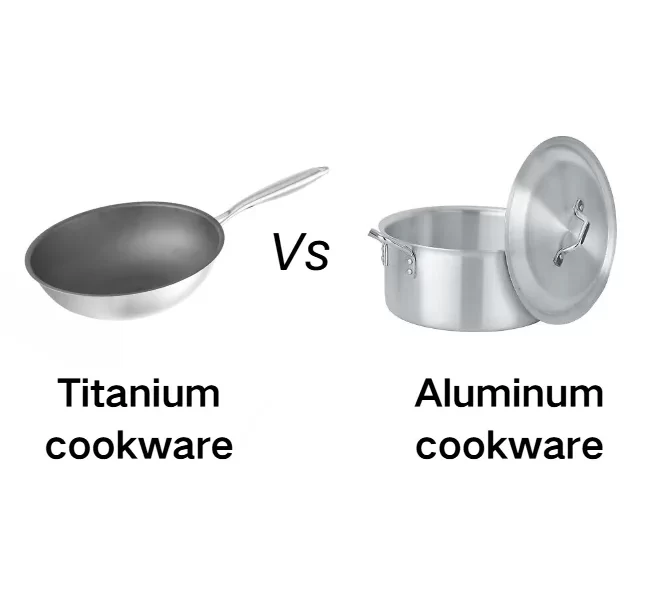
Una cocina sana debe empezar por elegir "buenos" utensilios de cocina. Hoy en día, en las estanterías hay una gran variedad de utensilios de cocina entre los que elegir. Las baterías de cocina de titanio y aluminio suelen llamar la atención del público en general. Pero usted se preguntará: ¿Cuál es la más adecuada para mi cocina y mis métodos de cocción?
En la actualidad, Hengguang, una fabricante profesional de utensilios de cocina de titaniova a comparar con usted estos dos tipos de utensilios de cocina para encontrar las respuestas.
Propiedades de los materiales: Nacidos diferentes, creados para un fin
Para entender estos utensilios de cocina, hay que empezar por sus materiales básicos.
Batería de cocina de titanio: Materiales de calidad aeroespacial
Al titanio se le llama a menudo "material de grado aeroespacial" por una buena razón: es ligero pero más fuerte que el acero, y es un elemento básico en la ingeniería aeroespacial. Como material para utensilios de cocina, el titanio brilla por sus propiedades únicas:
- Ligero pero duradero: El titanio tiene una densidad de 4,5-4,516 g/cm³ (a 20°C), más ligero que el acero pero más denso que el aluminio. Sin embargo, su relación resistencia-peso supera a la de la mayoría de los metales, lo que permite a los fabricantes fabricar paredes de cacerolas finas pero resistentes.
- Resistencia inigualable a la corrosión: El titanio forma de forma natural una fina capa de óxido inerte (TiO₂) cuando se expone al aire o a los líquidos. Esta barrera "autocurativa" evita la oxidación, las manchas o las reacciones con alimentos ácidos o alcalinos, incluso tras años de uso.
- Superficie no reactiva: A diferencia de muchos metales, el titanio no lixivia iones en los alimentos, por lo que es una opción segura para ingredientes sensibles.
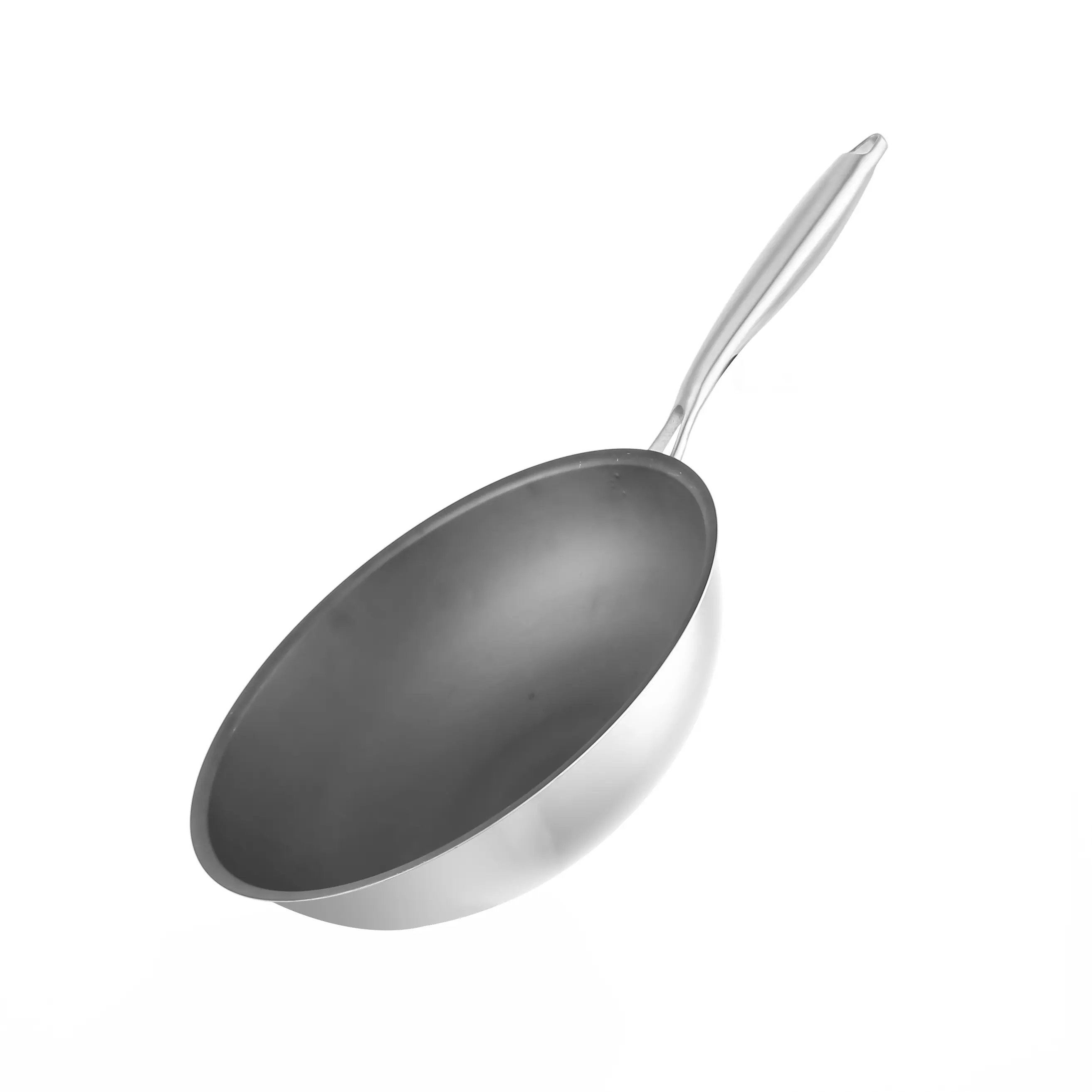
Cacerolas de aluminio: El caballo de batalla
El aluminio es asequible, está ampliamente disponible y es muy apreciado por su eficiencia térmica. He aquí por qué ha superado la prueba del tiempo:
- Conductividad térmica excepcional: Con una conductividad térmica de 237 W/mK (frente a los 14,63 W/mK del titanio), el aluminio propaga el calor de forma rápida y uniforme. Esto se traduce en una ebullición más rápida, menos puntos calientes y una cocción energéticamente eficiente.
- Ligero y asequible: El aluminio es más ligero que el hierro o el acero inoxidable, y su bajo coste de producción lo hace accesible a la mayoría de los hogares.
- Naturalmente resistente a la corrosión: El aluminio reacciona con el oxígeno para formar una capa protectora de óxido que evita la oxidación en la mayoría de las condiciones cotidianas.
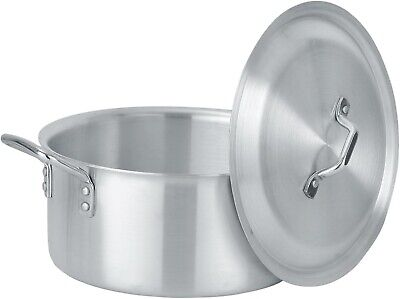
Seguridad sanitaria: El titanio toma la delantera
Cuando se trata de cocinar, lo que cocinar con asuntos tan cómo.
El titanio: El metal "biocompatible
El titanio es considerado un material "biocompatible", cuya inercia en el cuerpo humano está científicamente demostrada. El sitio Manual ASM(una de las principales autoridades en ciencia de materiales) confirma: "El titanio y sus compuestos son fisiológicamente inertes, sin efectos adversos conocidos en los sistemas nervioso o digestivo humanos".
Esta inercia se traduce en una cocción más segura:
- Sin lixiviación de metales: Incluso al cocinar alimentos ácidos como tomates, cítricos y una mezcla de vinagre, el titanio no libera iones en la comida. Esto preserva el sabor original de los ingredientes, sin regusto metálico.
- Seguro para la cocina medicinal: El titanio es el sólo Sartén metálica recomendada para hervir a fuego lento hierbas medicinales chinas tradicionales (conocidas por su pH ácido). Su superficie no reactiva garantiza que no se produzcan interacciones perjudiciales con los compuestos medicinales.
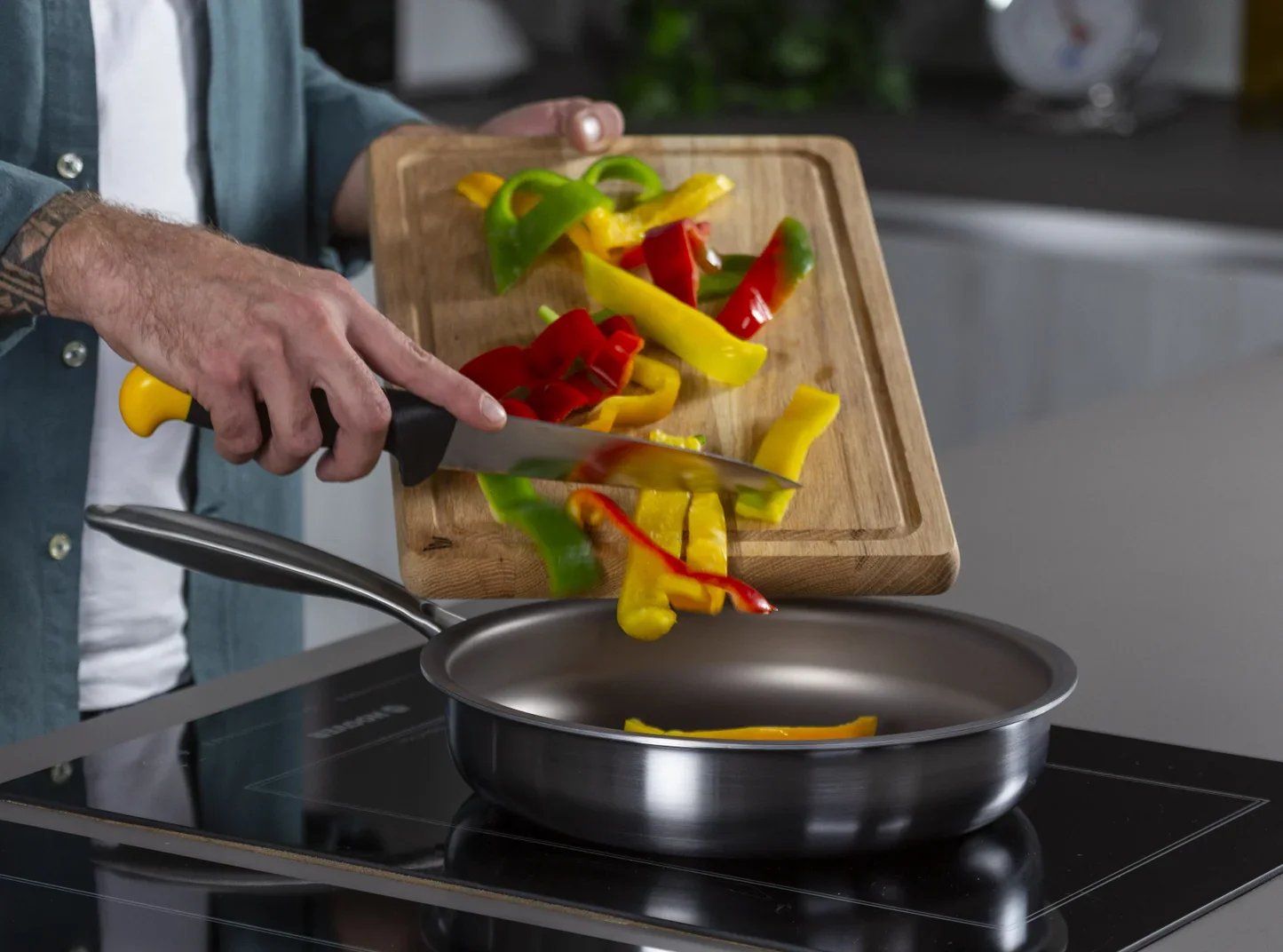
Aluminio: ¿Un riesgo oculto para la salud?
Aunque el aluminio suele ser seguro en pequeñas cantidades, su reactividad plantea riesgos bajo ciertas condiciones:
- Lixiviación inducida por ácido/calor: A altas temperaturas (superiores a 150°C) o en entornos ácidos o alcalinos, el aluminio puede filtrarse en los alimentos. Incluso el aluminio "anodizado" (tratado para endurecer la superficie) puede degradarse con el tiempo si se raya o se frota con fuerza.
- Problemas de salud a largo plazo: La ingesta excesiva de aluminio está relacionada con enfermedades neurodegenerativas como el Alzheimer. Aunque se debate el umbral exacto, los estudios sugieren que la exposición acumulativa aumenta el riesgo, especialmente en niños y ancianos.
- Reactividad con alimentos ácidos: Cocinar salsa de tomate o zumo de limón en ollas de aluminio puede acelerar la lixiviación, dejando un sabor metálico y riesgos potenciales para la salud.
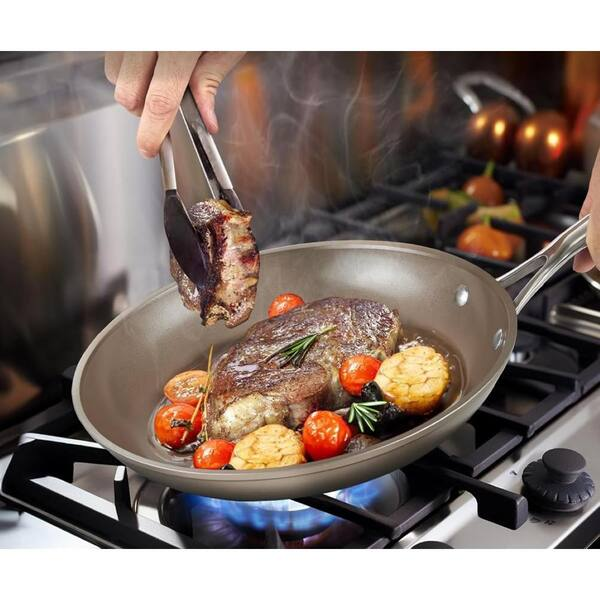
Viabilidad: Ventajas y desventajas
Más allá de la seguridad, ¿cómo se comportan estos utensilios en la cocina? Analicémoslo:
Peso: Ambos ligeros, pero el titanio lleva ventaja
La elevada relación resistencia-peso del titanio le permite ser más fino y ligero que el aluminio sin sacrificar su durabilidad. Una batería de cocina de titanio pesa 10-15% menos que una de aluminio del mismo tamaño, lo que resulta ideal para los cocineros domésticos o las personas con problemas de movilidad.
Conductividad térmica: El superpoder del aluminio y la ingeniosa solución del titanio
La conductividad superior del aluminio (237 W/mK frente a los 14,63 W/mK del titanio) hace que se caliente y ajuste más rápido. Sin embargo, el titanio lo compensa con dos trucos:
- Paredes finas: Al utilizar láminas de titanio ultrafinas (0,3-0,5 mm), los fabricantes reducen la resistencia al calor.
- Condensación gota a gota: La superficie del titanio favorece la formación de gotas de vapor en lugar de una película continua, lo que minimiza la pérdida de calor durante la cocción.
El resultado es que los utensilios de titanio calientan casi tan eficazmente como los de aluminio, sin riesgo de lixiviación.
Durabilidad y mantenimiento: La longevidad del titanio gana
Titanio: Gracias a su capa de óxido, los utensilios de cocina de titanio resisten arañazos, abolladuras y corrosión. Se pueden lavar en el lavavajillas (aunque se recomienda lavarlos a mano para conservar el revestimiento antiadherente) y pueden durar entre 10 y 15 años con los cuidados adecuados.
Aluminio: Los utensilios de cocina de aluminio son propensos a arañazos y abolladuras, incluso una espátula de metal puede dejar marcas. Con el tiempo, estos arañazos exponen el aluminio fresco a los alimentos, lo que acelera la lixiviación. Además, el aluminio tiene un punto de fusión bajo (660°C), lo que lo hace inadecuado para cocinar a altas temperaturas o por inducción (a menos que esté especialmente recubierto).
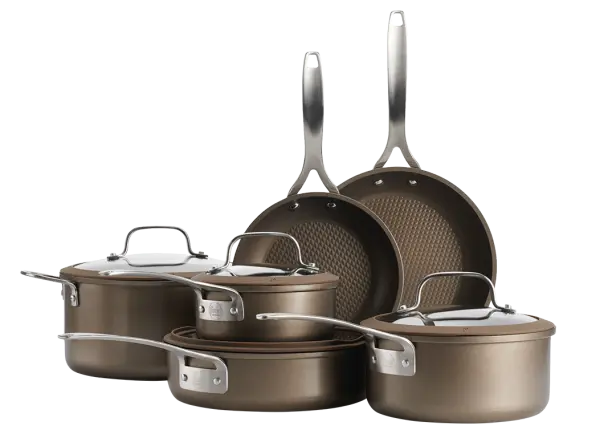
Escenarios aplicables: Cada uno tiene sus puntos fuertes
Las ollas de titanio son adecuadas para personas que prestan atención a una alimentación sana; cocinan con frecuencia alimentos ácidos como tomates, limones, etc., y usuarios que esperan que los utensilios de cocina sean duraderos y fáciles de mantener.
Las ollas de aluminio son adecuadas para familias con presupuestos limitados, escenarios que requieren una rápida conducción del calor para cocinar y usuarios que no cocinan con frecuencia alimentos ácidos.
Resumen: Cuadro comparativo
| Características | Sartén de titanio | Bandeja de aluminio |
| Salud y seguridad | No tóxico, no lixivia metales | Puede lixiviar iones de aluminio, lo que supone riesgos para la salud |
| Peso | Ligero | Ligero |
| Conductividad térmica | Baja, pero puede mejorarse mediante el diseño | Excelente |
| Resistencia a la corrosión | Extremadamente fuerte, incluso resistente al agua regia | Moderado, no resistente a ácidos/bases fuertes |
| Durabilidad | Larga vida útil | Inferior, propenso a deformarse/dañarse |
| Precio | Caro | Asequible |
| Dificultad de mantenimiento | Simple | Requiere más mantenimiento |
Cómo elegir una batería de cocina de titanio o una de aluminio
Las ollas de titanio son mucho mejores que las de aluminio en términos de salud, seguridad, durabilidad y resistencia a la corrosión, pero son caras. Las ollas de aluminio tienen ventajas en cuanto a conductividad térmica y precio, pero presentan riesgos para la salud y una vida útil más corta.
Si prioriza la salud y la seguridad y dispone de un presupuesto suficiente, los utensilios de cocina de titanio son sin duda una mejor elección. Sus propiedades no tóxicas y su excelente resistencia a la corrosión lo convierten en un utensilio de cocina ideal para las familias que persiguen un estilo de vida saludable.
Si tu presupuesto es limitado y te preocupa más la conductividad térmica y el precio, las ollas de aluminio también son una buena opción, pero es importante evitar cocinar alimentos ácidos y sustituirlas rápidamente.
Independientemente del tipo de batería de cocina que se elija, debe adquirirse en canales legítimos para garantizar la calidad y seguridad del producto. Espero que este artículo le ayude a tomar decisiones acertadas y a disfrutar de una cocina sana y deliciosa.
Quiénes somos

Como líderfabricante experto en titaniocon más de una década de especialización, Hengguang fabrica utensilios de cocina de titanio de alta calidad que combinan la ciencia de los materiales de vanguardia con la precisión culinaria. Nuestras aleaciones de titanio, aptas para uso alimentario, no reactivas y diseñadas para durar, ofrecen una seguridad inigualable, un rendimiento ligero y una distribución uniforme del calor, lo que las convierte en la elección de chefs domésticos y profesionales de todo el mundo.
Más allá de los productos estándar, destacamos ensoluciones de titanio a medidaDesde diseños de asas ergonómicas y acabados de colores personalizados hasta sartenes de calidad comercial optimizadas para inducción o uso intensivo, adaptamos cada detalle a sus necesidades. Con certificaciones rigurosas (FDA, LFGB) y un enfoque en la fabricación sostenible, Hengguang garantiza que sus utensilios de cocina de titanio no solo son funcionales, sino que están hechos para durar.